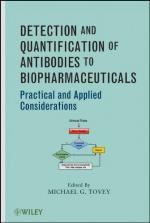|
This section contains 932 words (approx. 4 pages at 300 words per page) |

|
Antibodies are protein molecules that function in the body's immune response. They are present throughout the circulatory and lymph systems, and are therefore exposed to all tissues in the body. An antibody is able to recognize and bind to a particular offending antigen. Antigens stimulate immune responses because they are recognized to be foreign, or "non-self." Invaders such as bacteria, viruses, fungi, toxins, and other foreign substances generally carry a variety of antigens on their surfaces.
The antibody for a particular antigen functions by binding to that antigen. This results in one of two possibilities. The antibody may deactivate the antigen by either blocking its active site or otherwise changing it so that it can no longer harm host cells. Alternatively, an antibody may label the antigen-carrying object for destruction. In this case, one part of the antibody binds to the antigen while another part binds to immune...
|
This section contains 932 words (approx. 4 pages at 300 words per page) |

|


